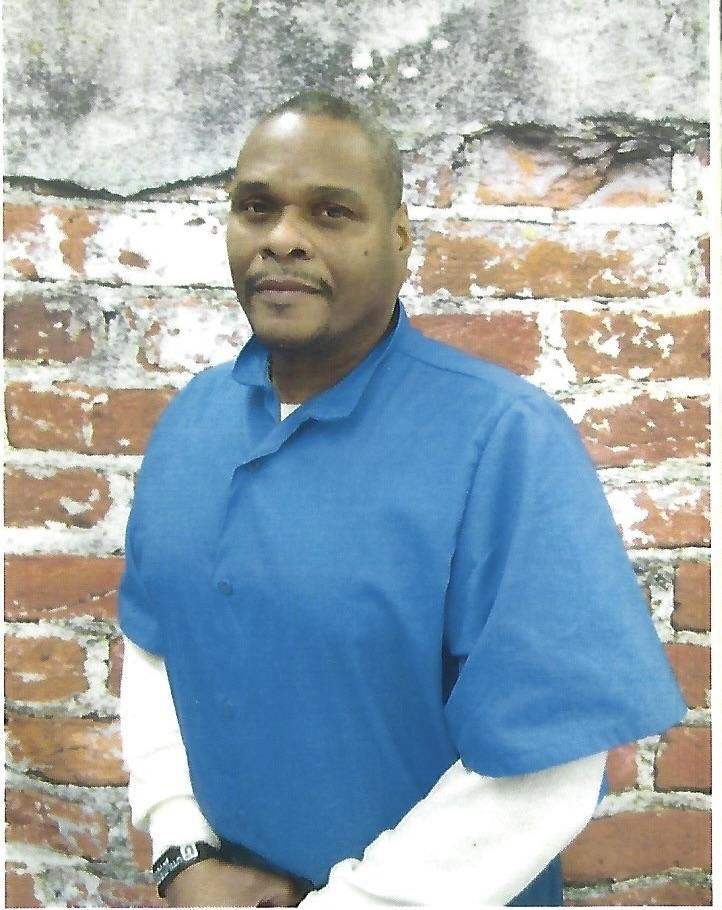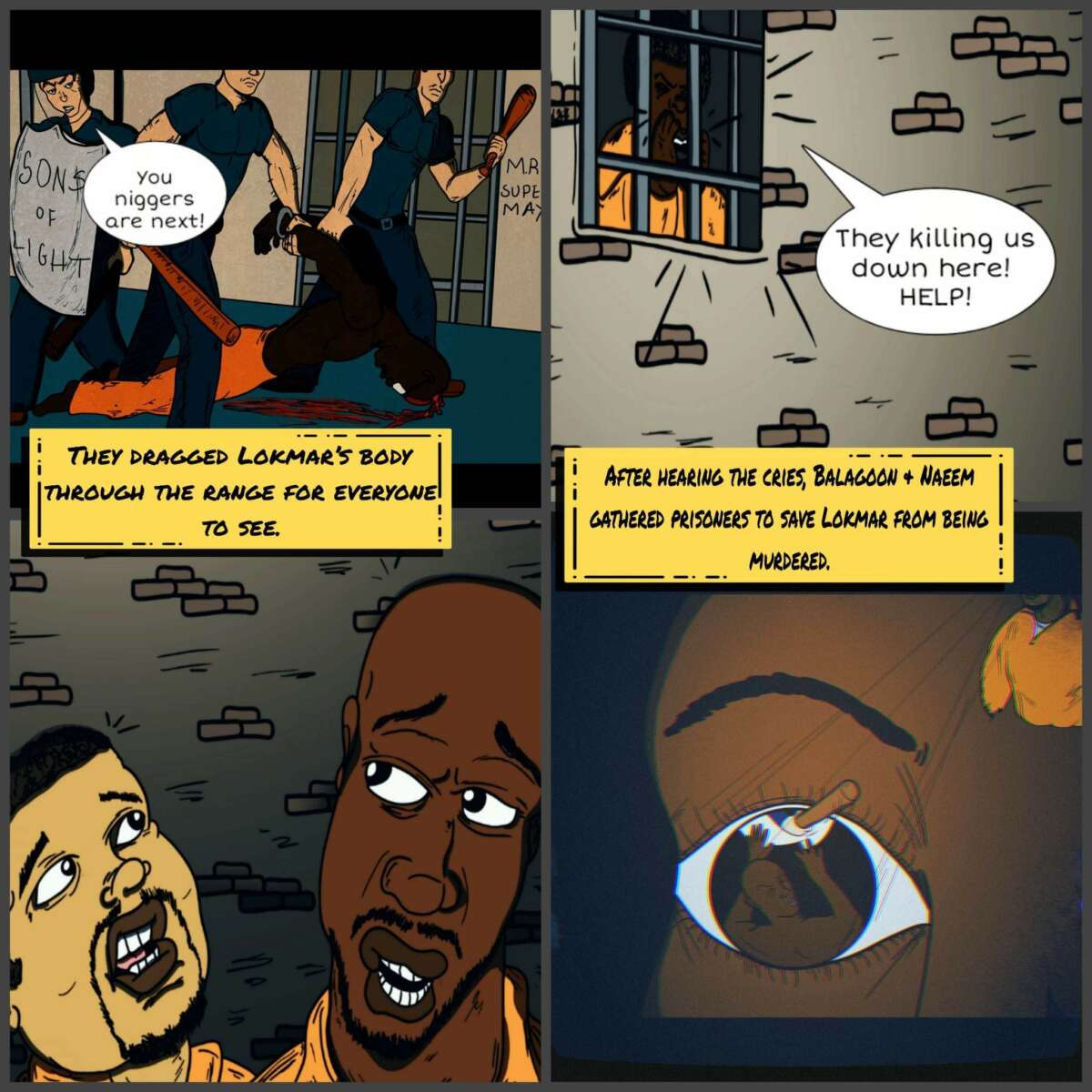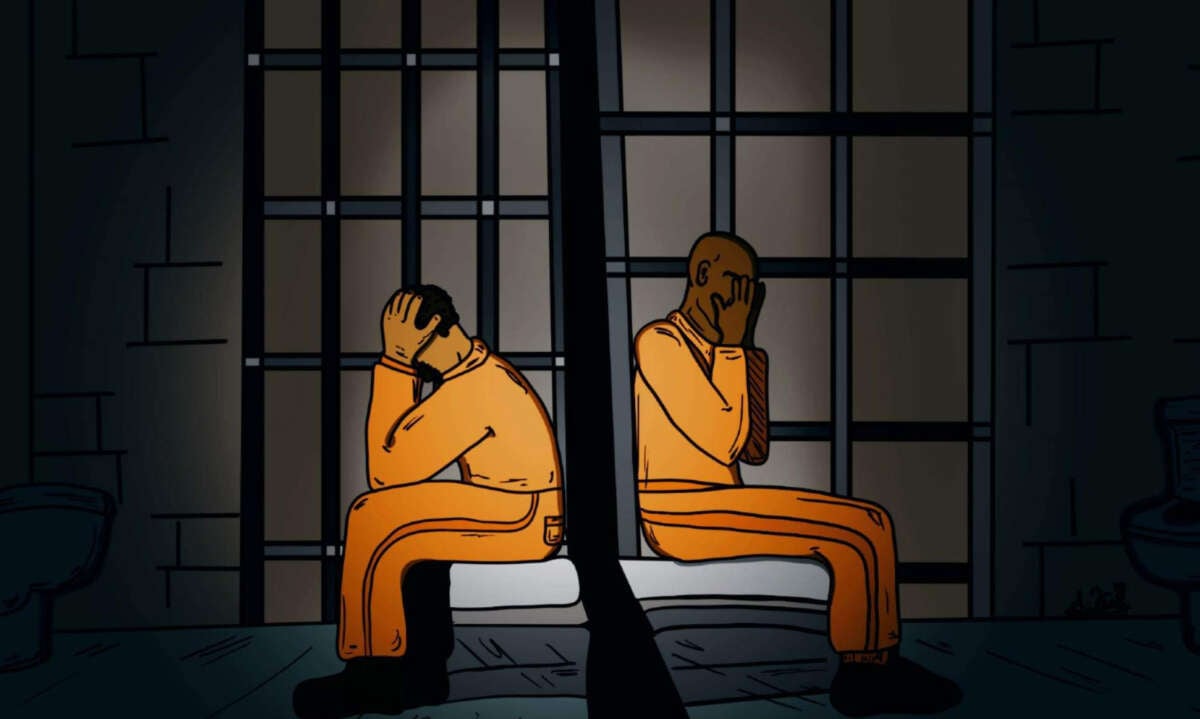Part of the Series
The Road to Abolition
Christopher “Naeem” Trotter had three months left in prison. Then, on February 1, 1985, he tried to save another incarcerated man’s life in a fight against white supremacists — and was punished with over a century behind bars.
In 1985, 23-year-old Trotter was finishing a four-year prison sentence at the Indiana Reformatory, which is now known as the Pendleton Correctional Facility.
That February morning, he reminded himself that soon, he would be home and able to care of his mother, whose mental health had been declining. He was also looking forward to meeting his 3-year-old daughter, who was born while he was imprisoned.
“I was a momma’s boy,” he told Truthout. “It was my beloved mother who always taught me to stand up for that which is right and to never just stand by and watch acts of injustice take place.” As a child, he had shielded both his brother and mother from his father’s violence. And that morning, though he didn’t know it, he would act to protect someone else — and pay for it with his freedom.
First, he smelled mace. He knew from experience that could only mean that the prison guards were using it against other incarcerated men. Then he heard men hollering, “They’re killing Lincoln Love! They’re killing him!”
Trotter knew Lincoln Love. Known to his peers as Lokmar Abdul-Wadood, Love was a jailhouse lawyer, or an incarcerated person who helped others with their legal work.
That morning, according to Rodney Jones, who was in the cell directly across from Love, guards arrived at Love’s cell and ordered him to “cuff up,” or prepare to be handcuffed and have his cell searched. Before Love could rise from his bunk, several officers entered his cell and began beating him. They continued to beat him after handcuffing him and even after he was unconscious, Jones told Truthout.

This in itself was not unusual — Trotter and several other men who had been incarcerated during that time attested that staff brutality, particularly against Black men, was rampant. Two years earlier, people at the reformatory had filed civil rights complaints with the U.S. Justice Department. They had also sent multiple letters to the local newspaper about individual instances of harassment and abuse. What was unusual was what happened next.
Other men also heard the cries for help. John “Balagoon” Cole was friends with Love. He, too, had experienced staff violence and wanted to protect his friend. Cole, Trotter and half a dozen other men went to the captain’s office to demand that he stop the beating. There, they encountered club-wielding guards, who tried to chase them off. The men fought back, injuring several guards, before heading to the infirmary, where they had been told Love had been taken.
At the infirmary, more officers confronted them.

Minkah Becktemba had been working at the prison laundry that morning when he saw guards dragging Love across the yard to the hospital. Shortly after, the prison called a lockdown. He tried to get into his housing unit, banging on the door until the guard on duty unlocked the door. When he did, several other men, including Cole and Trotter, poured in. They took over the unit and held three staff members hostage.
“We didn’t intend to take over the cell house,” Trotter explained. “If we could have surrendered without any physical reprisals, we would have.”
“We were forced to take hostages and take the house so that we could negotiate a peaceful resolution,” Cole elaborated. Both believed that, had they not done so, guards would have killed them.
From the housing unit, Becktemba called WTLC, a local Black radio station, and asked reporters to come to the prison. “That was what we had to do or else we’d end up dead,” he told Truthout. WTLC contacted other media, which soon arrived at the prison.
The men issued 14 demands, including investigations into all allegations of staff violence, adequate medical care, pay raises for prison jobs, improved educational programs, and no physical reprisals against those who had participated in the uprising. They also demanded that media be allowed to interview them about prison conditions.
After 17 hours, prison officials agreed to their demands. The men released the hostages. Media trailed the men as they were placed in segregation; the journalists’ presence ensured their safety. Within days, prison staff transferred Becktemba, Cole and Trotter to the Indiana State Farm (now Putnamville Correctional Facility).
Prison records and media accounts at the time stated that Trotter and Cole stabbed or slashed seven staff members that morning. Prosecutors filed criminal charges against Trotter, Cole, Becktemba, and three other men. The trial of Trotter and Cole was severed from the others. Prosecutors charged the two with attempted murder, rioting, assault and several counts of confinement (or kidnapping).
At their trial, Michael Richardson, one of the guards whom Cole had stabbed, testified that Pendleton’s officers were members of a white supremacist group called the Sons of Light. He explained that, while the group is not affiliated with the Ku Klux Klan and doesn’t pay Klan dues, it uses the same literature and engages in similar types of rituals. He also testified that staff had beaten Lincoln Love even after he was handcuffed and posed no threat, and that they continued to beat, kick and stomp him after he fell unconscious.
Cole, who had three-and-a-half years left on his sentence, was acquitted of attempted murder but convicted of four counts of criminal confinement, each carrying a 20-year prison sentence, and rioting. The judge sentenced him to consecutive sentences for a total of 84 years. He spent 32 years and five months in solitary. In August 2017, he was allowed back into general population where he could have human contact. His release date is 2038. By then, he will be 79 years old.
Trotter, who had been looking forward to taking care of his mother and young daughter, was convicted of attempted murder, criminal confinement and rioting. He was sentenced to 142 years.
In 1990, the Indiana Supreme Court upheld Trotter’s and Cole’s convictions.
Becktemba was tried separately. Prosecutors charged him with five counts of confinement, conspiracy to confinement, rioting and conspiracy to riot. Each charge carried a maximum of 20 years. Ultimately, Becktemba was convicted of rioting and acquitted of all else. He was released in the mid-1990s.

“A Racist Subculture Has Been Allowed to Flourish in a State Prison”
Michael Richardson’s testimony was the first time that many of the incarcerated men heard the name the Sons of Light. (Trotter had previously seen the group’s literature on a captain’s desk.) But all knew that there were white supremacists among the staff. “We just thought it was a contingent of racist guards that got off on beating Black prisoners,” Cole said.
In 1986, Richardson and five other guards filed a federal lawsuit against the Indiana Department of Corrections charging that the beating of Lincoln Love had sparked the riot, that staff violence was a commonly accepted practice at the prison and that, by failing to stop these beatings, officials had exposed them to danger of retaliation. That same year, the prison fired William Wicker, one of the supervising officers involved in Love’s beating.
“My mother always taught me that life was bigger than just myself, and you always have to be willing to help others no matter what the cost.”
Not much has been written about the Sons of Light, but white supremacy among law enforcement, including prison staff, is not uncommon.
By the time Cole and Trotter arrived, the Indiana State Farm was a hotbed of white supremacy among employees. According to a report drawn from over 1,000 prison documents, a group known as “the Brotherhood” terrorized both incarcerated people and other employees. Unlike the Sons of Light, Brotherhood members were largely non-guard staff, including cooks, food service employees and maintenance foremen.
By 1991, they were openly flaunting Brotherhood tattoos and swastika rings. Brotherhood staff were repeatedly charged with spitting in the food of Black prisoners, assaulting Black prisoners, threatening staff and incarcerated people, and vandalizing property. But fears of violent reprisals often kept witnesses from cooperating with investigators even when complaints were filed. In 1994, an internal affairs investigator submitted a report about a Brotherhood member who had assaulted an incarcerated person and tampered with evidence to cover up his attack. Five days later, while the investigator was celebrating his birthday at a local bar, the officer under investigation and two other Brotherhood members brutally beat him. At trial, the judge barred testimony about the investigation, the Brotherhood and past charges against the assailants. They were acquitted and, later, given subsidized housing on prison grounds. The racism, threats and violence continued into the 2000s.
In 2001, when the governor took no action, DePauw University released the report about the Brotherhood. But the implications, wrote report author Kelsey Kauffman, extend beyond one organization inside one particular prison.
“What is not important is whether the Brotherhood exists as a formal organization with membership lists, initiation rites, by-laws or established means of succession. Nor is it important whether the group has a political or social agenda beyond self-aggrandizement of its members, especially its leaders,” Kauffman noted. “What is important is that a racist subculture has been allowed to flourish in a state prison; that the members of that subculture have used violence, intimidation, and harassment against other staff and inmates over the course of many years to gain power at the prison; that they have used that power to shield their friends and punish their foes; and that they have done all of this with the full knowledge and active protection of their superiors including the state commissioner of correction.”
No such report has been written about the Sons of Light. It is unclear whether the group still exists or if any other organized white supremacist group is active among staff at Pendleton.
What is clear is that, nearly four decades after members of the Sons of Light beat Lincoln Love, John “Balagoon” Cole and Christopher “Naeem” Trotter remain in prison for defending him.
“The Attica of Indiana”
The last time Trotter saw his beloved mother was in the courtroom. By then, her mental health had deteriorated and she was oblivious to the goings-on. “All she wanted was to see her son,” he said. Trotter recalled that prosecutors were demonizing him and Cole but, when he turned around, he saw a glow in his mother’s eyes, one that he remembered from his childhood.
In March 1996, Trotter was still in solitary when guards woke him, ordered him to cuff up and took him to the prison case worker, who told him that his mother had been killed in a car accident. Then he was returned to his cell to mourn in isolation.
In 2019, after filing multiple legal petitions, Trotter was granted a resentencing hearing. The judge resentenced him to 122 years, stating, “Those guards expect the rest of us to have their backs.” By then, Trotter was 56 years old.
The three-year-old daughter that Trotter had been eager to meet is now an adult and a mother of four. Still, neither Trotter nor Cole regret taking action that day.
“If people had intervened the day that George Floyd had been beaten by racist police, he would be alive today,” Trotter said. Had the men not acted, Trotter is certain that the guards would have killed Love. (Love remained in prison, where he died of COVID in 2020.)
“I spent decades in solitary confinement, in a windowless cell 23 hours a day, asking myself, ‘If I had to do it all over again, would I [have] sacrificed my freedom, plans to take care of my beloved mother, and be a present father to my daughter?’” Trotter told Truthout.
Then he answered his own question. “I would have done the same thing and [come] to the defense of a fellow human being who could not defend himself from the savage beating by racist prison guards because I am my beloved mother’s son. My mother always taught me that life was bigger than just myself, and you always have to be willing to help others no matter what the cost.”
Cole also does not regret his actions that day. In 2022, he began having seizures. A CAT scan revealed that he had a brain tumor, which required surgery. He is applying for the court to modify his sentence, noting that had the judge ordered his sentences to run concurrently (or at the same time), he would have been released years ago. He repeatedly noted that no one died that day and that the consecutive sentences were meant to send a message to other incarcerated people.
That message has been repeated throughout the years inside the prison. In 2011, one man recounted that officials still used their example to quell organizing.
“The way it’s understood in prison, it’s like the Attica of Indiana,” Too Black, the communications coordinator of the Defense Committee to Free the Pendleton Two, told Truthout.
Outside of prison, however, Cole and Trotter were largely relegated to newspaper archives.
That changed in 2022, nearly four decades after that fateful February morning, when organizers with IDOC Watch, an abolitionist prisoner support group, created the Defense Committee to Free the Pendleton Two.
Through public events, protests, social media, podcasts and an upcoming documentary, they’re reminding the public about the men’s ongoing punishment and galvanizing pressure not only to free both men, but also to spark wider outrage about the state’s abusive treatment of Black people.
And, for Cole and Trotter, they’re hoping to finally go home.
“I gave Indiana my flesh and blood for the crimes that I committed — not just on February 1, but for all the crimes committed over the course of my life,” Cole said. “They’ve gotten more than their due from me. It’s time to let me go.”
To book a screening of the film or for more information, please contact the Defense Committee to Free the Pendleton 2 at thependleton2@gmail.com.
Join us in defending the truth before it’s too late
The future of independent journalism is uncertain, and the consequences of losing it are too grave to ignore. To ensure Truthout remains safe, strong, and free, we need to raise $17,000 by midnight tonight. Every dollar raised goes directly toward the costs of producing news you can trust.
Please give what you can — because by supporting us with a tax-deductible donation, you’re not just preserving a source of news, you’re helping to safeguard what’s left of our democracy.
